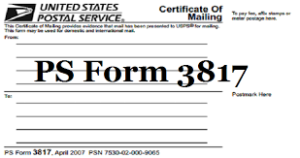Amendment to CCP § 415.20 will allow substituted service at a CMRA on the first attempt
An amendment to California Code of Civil Procedure [CCP] § 415.20, (effective 1/1/18) has been added allowing substituted service of a lawsuit of an individual defendant on the first and only attempt at a commercial mail receiving agency [CMRA] (e.g., The UPS Store, Postal Annex, etc.). The amendment authorizes service “in the manner described in subdivision (d) of Section 17538.5 of the Business and Professions Code [B&P Code].”
Existing law allows for substituted service of a summons on a) business, and b) an individual. Substituted service on a business may be served on the first attempt by leaving a copy with anyone apparently in charge of the business or at a mailing address. Service on an individual defendant generally requires multiple attempts – due diligence – before substituted service may be made at a home, business, or mailing address. Although due diligence is not defined by statute or case law – only what it isn’t – each venue in California defines it locally. Generally, 3 to 4 attempts would suffice, provided the time of the attempts and days are varied. Substituted service requires a follow-up First Class mailing to the address where the service was made whereupon service is deemed complete 10 days after the date of mailing.
The new amendment adds a new manner of service, subsection CCP § 415.20(c), when serving an individual at a CMRA. The amendment only applies to mailing addresses at a CMRA. It does not apply to any other mailing address, such as the former co-tenant who collects mail for the defendant who moved out, or the mother of the homeless son or daughter who collects his or her mail, or the father of a student, where a car is registered, who lives on a campus at a distant university.
The main feature of this amendment is that substituted service may be made without due diligence, and is deemed effected upon delivery, pursuant to B&P § 17538.5. Service, however, is not complete until a CMRA complies with B&P § 17538.5(d).
What is B&P § 17538.5?
B&P Code § 17538.5, governs how a CMRA must operate. It sets forth requirements and obligations.
It imparts several duties on a CMRA, and upon receipt of service, it shields them from liability to the box holder. As a condition to accept mail for a mail receiving customer, the CMRA must accept 2 forms of ID before renting the customer a box. The mail receiving customer must sign an agreement affirmatively appointing the CMRA as its agent for service. That form, or any amendment or correction to the form, contains a home or personal address.
Because of this affirmative appointment of the CMRA as its agent for service, it could be argued that service on the CMRA is a personal service, not a substituted service. Service under B&P Code § 17538.5(d) could be construed as a form of personal service, akin to CCP § 416.90 wherein a defendant authorizes another to accept service on their behalf. This can only be valid if – and only if – the 3d party, here, the CMRA, fully complies with the B&P § 17538.5(d).
Under B&P Code § 17538.5(d), the CMRA is required to
- accept any service of process for the mail receiving customer for up to 2 years after the customer terminates the agreement;
- Within 48 hours after receiving process the CMRA must place a copy of the process in the box of the mail receiving customer (unless the agreement has been terminated);
- Within 5 days, the CMRA must mail a copy of the served documents to the mail receiving customer to their last known home or personal address;
- The CMRA must purchase a Certificate of Mailing (PS Form 3817) for $1.35 which can only be
 obtained by standing in line and mailing the documents at a US Postal Service office;
obtained by standing in line and mailing the documents at a US Postal Service office; - If the CMRA has complied with these requirements, the CMRA must provide any involved party a declaration under penalty of perjury of the mailing and attach a copy of the Certificate of Mailing, stamped by the USPS.
Service under the new CCP § 415.20(c) is deemed effected 10 days after the CMRA mails the copy to the defendant at the last known home or personal address on the agreement form.
What does B&P § 17538.5 really do?
If the CMRA complies with the requirements in B&P § 17538.5 they are not liable to the mail receiving customer if a judgment is rendered against them for failure to receive notice of the action. This section really isn’t a service of process statute, but describes what a CMRA must do to escape liability to the box holder/defendant.
There is no duty owed to the plaintiff or the process server for failure to comply. The inference is that liability would only attach if a judgment was rendered against the mail receiving customer.
Cross referencing this section under new CCP § 415.20(c) elevates compliance with B&P § 17538.5, limiting liability exposure, to when and whether substituted service is deemed effective.
Why is this statute flawed?
This statute is flawed because CMRAs seldom, if at all, fully complied with these requirements. Generally, they accept the papers and place them in the mail receiving customer’s box. That is all. Many flip the server a ration of attitude and toss the papers in the trash and attempt to refuse service. Last month I had a CMRA proprietor throw the papers back at me which hit me in the face, then land in the gutter. There they remained as a got into my car and drove off.
Furthermore, I have heard of several instances where service on a CMRA was invalidated because the CMRA did not comply. If there is no mailing, the court cannot determine the date that the defendant is in default.
Why will this a change in the law lead to confusion?
Because this amendment references this flawed statute, process servers will be unwittingly serving CMRAs on the first attempt, without due diligence, relying on the CMRA to comply with B&P § 17538.5(d).
Substituted service under CCP § 415.20(b) at a mailing address, and service under B&P § 17538.5 are two in-congruent manners of service which cannot be reconciled. Substituted service under CCP § 415.20(b) requires a delivery and a mailing to the defendant’s address where the service is made – in this case, the CMRA location.
Under the new law, B&P § 17538.5 requires delivery to the CMRA, and CMRA must mail to “the mail receiving customer to their last known home or personal address” listed on the agreement signed by both the CMRA and the box holder. In the context of B&P § 17538.5, that “last know home or personal address” is one known only to the CMRA – not the process server.
The server cannot cure a defect in service under CCP § 415.20(c) by mailing to the defendant at the place where the service was made, because it must be mailed by the CMRA to the defendant’s address they have on file.
Therefore, this amendment to CCP § 415.20 does not make it easier and more efficient for process servers. It will likely induce process servers, and litigants directing their process servers, to sub-serve the mail receiving customer on the first attempt, with a futile reliance that the CMRA will follow through with their statutory obligations. It may lead to defendants filing motions to quash service, or set aside defaults, resulting in delays to commence court cases. It may expose process servers to liability and/or additional costs for re-service.
How can you properly serve the mail receiving customer at a CMRA?
A server should continue to rely on CCP § 415.20(b), existing law, by establishing (pointless) due diligence at personal service, and sub-serve the defendant on the 3d or 4th attempt, and mail a copy to that address via First Class Mail.
If the service is made without due diligence under CCP § 415.20(c), and CMRA fails to comply with B&P § 17538.5, it will not likely result in a valid service.


Pingback: New Manner Of Service? Substituted Service At Commercial Mail Receiving Agencies (CMRA) | The Advance Sheet